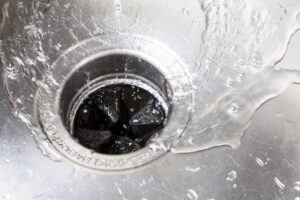If you’ve always had a garbage disposer in your kitchen, you likely can’t imagine handling cooking meals and cleaning up afterwards without it. It’s a great convenience for getting rid of food waste without needing composting buckets, and it helps the environment by keeping extra waste out of the landfills.
You can expect your garbage disposer to last for about 15 years if you know how to treat it right. How can you treat it right? We’re here to tell you in this post.
Don’t run hot water down it
You may have heard the opposite advice regarding this: only run hot water down the disposal when it’s operating. This makes sense because hot water breaks up fats, oils, and grease. Here’s the problem: it’s better to keep fats, oils, and grease (collectively known as FOG) solid so they wash fully down the drain. Cold water will help keep them this way. Hot water will allow them to seep into parts of the disposer where they’ll later cause problems. You should also try to keep as much FOG out of the disposer as possible.
Always run water down the disposer when it’s on
You don’t want the moving parts of the disposer to run when there’s no water flowing through it. This creates too much friction and can lead to parts wearing down early.
Don’t keep resetting the disposer over and over
The reset switch on the bottom of the disposer unit is an individual circuit breaker that activates when the motor starts to overheat. You’ll have to reset it on occasion, unusually if something gets stuck in the hopper. However, you shouldn’t need to reset it most times when you use the disposer. This warns of a possible electrical issue. Call to have your disposer repaired if this happens.
Don’t try to “sharpen the blades” with ice cubes
This doesn’t work because garbage disposers don’t have sharp blades. They use blunt impellers to hurl food waste against an outer grind ring. Putting hard objects like ice cubes into the disposer risks damaging it. If your disposer doesn’t seem to be grinding down food well enough or is creating numerous clogs, have a plumber look at it.
Know what shouldn’t go down the disposer
Here are items that don’t go down a disposer:
- Actual trash—i.e. anything non-organic.
- Any food waste that’s too hard to chew with your teeth. This includes fruit pits, meat bones, and unpopped popcorn kernels.
- Stringy or fibrous foods, such as asparagus, celery, and onion skins.
- Coffee grounds.
- Pasta and rice.
- Liquid fats, oils, and grease, all of which congeal when they cool down.
We work on garbage disposers in Ocean City, MD and throughout Delaware and the Maryland Eastern Shore, so if you do encounter trouble with your disposer, we’re ready to help. We have emergency 24/7 service available for when the troubles can’t wait for regular office hours. You can trust our award-winning customer service, thirty years of experience, and excellent follow-up and communication.
At Atlantic Refrigeration & Air Conditioning, Inc., “We Take Pride in Your Comfort!” Call us when you need service for your garbage disposer.

